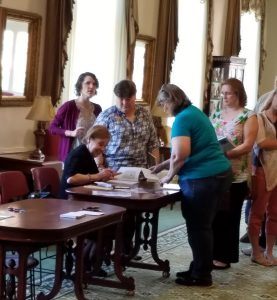
Judson welcomed Marion Blumenthal Lazan to campus on Tuesday, March 21. She was eagerly anticipated for several months, and several events helped to prepare the student body for her visit. The education department hosted a simulation and brief presentation during the lunch hour to help bring the concentration camp experience to life to a degree. A limited number of copies of Lazan’s book, “Four Perfect Pebbles,” were made available to students in advance so they could begin to learn her story. As Jamie Adams, head of the Art Department at Judson noted, arranging for her visit had taken years. He explained, “Previously the [concert/lecture] committee had focused on bringing musicians to campus, and I was very eager to bring in a more varied sampling of speakers that might touch our other students in more diverse ways.” Despite various difficulties in scheduling, he continued that “the committee remained steadfast that she would be an incredible speaker for our students to experience.” When the day finally came for Mrs. Lazan to speak, the campus was ready.
The chapel session was AE, and many from MMI and the community were in attendance, along with students from Holy Spirit Catholic High School, so while the event was moved into the Alumnae Auditorium, it was still essentially full. Lazan, a petite woman, with a charismatic face that belied her age, ascended onto a step stool behind the podium, and her audience took notice.
She began to tell a story that she said was one “Anne Frank might have told,” later commenting that it “picks up where Anne’s left off,” referring to the fact that Frank’s story ends before she was taken to the Westerborg work camp, and eventually the Auschwitz death camp, as Lazan was. Lazan detailed in her New York accent how her family had delayed leaving an escalating Nazi regime to accommodate the needs of her grandparents. Shortly after their death, her family was taken to the Westerborg work camp, and later transferred to the Bergen-Belsen concentration camp. There, as a young child, she was forced by the grimness and boredom of the camp to invent games to amuse herself and keep her spirits up. One of these was finding “four perfect pebbles,” representing herself, her brother and her parents. If she could find four pebbles, in her mind, that meant they would all survive the camp safely. As it so happened, they all survived the “Last Transport,” which was the last three trains sent to Auschwitz in the last days on the war. Her father died shortly after they were liberated, but Lazan, her mother and brother began to recover, and eventually emigrated to the United States and built a life here.
She described how she came to about her experiences at the camps, which did not happen immediately. She began to bring up the memories, which she said even now is “as though I am relating a nightmare,” thirty years after the fact for a memorial of Kristallnacht. Teachers who heard her speak invited her into their classrooms, and her speaking career and book deal snowballed from there. Up until that point, she and her family had “needed to put it aside so [they] could go on with [their] lives.” She gave an example of how when she was in school in America, her friends would ask questions about her leg injury, which had left an impressive scar. Rather than share the story, she would dismiss it as a “bad burn” and change the subject.
All that has changed, and she and her husband, Nathaniel Lazan, are “running as fast as [they] can as long as they are able” to share the message that so few people now survive to tell. In addition to the historical details of the Holocaust, Mrs. Lazan highlighted three messages in her speech: faith, hope and love. Although her experiences have not failed to cause questions in her mind, she maintains that “Faith I will always have. After all, here I am.” She also holds to hope, and she put great emphasis on the power that a positive attitude had in the camp, and saying that we all have “survival skills within us.” She pointed out that she was always triumphant when she thought this way, saying she “always found [her] four pebbles.” Her final and most powerful message was one of love. She begged the audience to “look for similarities and respect the differences” in people, and to always be kind and respectful.